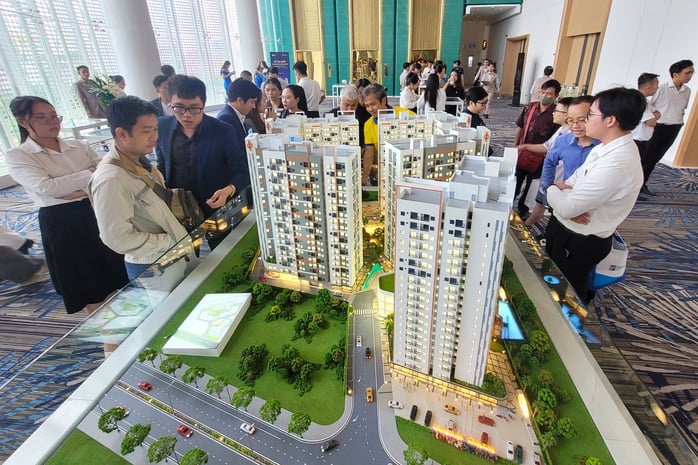At the 2025 Housing Real Estate Forum, organized by the Vietnam Real Estate Association (VNREA) in collaboration with the Nguoi Lao Dong Newspaper and the Real Estate Review Community on the afternoon of September 18th, Dr. Can Van Luc, Chief Economist of BIDV and a member of the advisory board, stated that a civil servant in Vietnam currently needs nearly 26 years of continuous work to be able to buy an apartment. This example reflects how housing prices are far exceeding the income of the vast majority of the population.
Out of reach
In fact, there are quite a few people similar to the case cited by Dr. Can Van Luc.
Mr. Dinh Thanh (residing in Phuoc Long ward, Ho Chi Minh City) said that after accumulating about 1.5 billion VND over many years, he planned to borrow more money from the bank to buy a one-bedroom apartment (50 m2) priced at around 3.2 billion VND in Binh Trung ward (formerly Thu Duc City). However, within just a few months, the price of the apartment increased to about 3.6-3.8 billion VND, forcing Mr. Thanh to put his home purchase plan on hold.
According to a reporter from the Nguoi Lao Dong newspaper, apartment prices in Ho Chi Minh City have been continuously increasing in a short period, reducing people's access to housing. Currently, the average price of apartments in Ho Chi Minh City has reached 80-89 million VND/m2; many projects even exceed 100 million VND/m2. Meanwhile, in 2024, Ho Chi Minh City's per capita GRDP is expected to be around 7,600 USD, or more than 197 million VND (equivalent to 16.4 million VND/month at the current exchange rate), ranking second among centrally-governed cities, after Hai Phong . For young people earning 20 million VND per month (higher than the average of 16.4 million VND mentioned above), even if they save all their money, it will take many years to be able to buy a house.

Apartments for sale in a project on the outskirts of Ho Chi Minh City. Photo: TAN THANH
According to a report from Batdongsan.com.vn, in just the past two years, land prices have increased by 44%, apartment prices by 42%, house prices by 28%, and project land prices by 14%. In Ho Chi Minh City, after the merger, real estate prices increased sharply, in some areas by 30%-60%; apartment prices alone increased by about 10%-18%.
According to statistics from the Institute of Economics ( Ministry of Construction ) in August 2025, in Ho Chi Minh City, apartments priced above 50 million VND/m2 account for 33% of the total housing supply in the city. With the income of young people, buying an average 70 m2 apartment would require an investment equivalent to 2.5 billion to nearly 4 billion VND.
Dr. Can Van Luc argues that incomes haven't kept pace with rising real estate prices, making home ownership increasingly out of reach for many. Dr. Tran Du Lich, meanwhile, likens the current real estate market to an airplane with only business class; there are no homes for middle-income earners.
Ms. Tran Thi Ngoc Lien, Deputy Director of the State Bank of Vietnam, Region 2, stated that the goal of owning a home in the city is a major challenge for many people, especially young people who have not accumulated much savings. According to Ms. Lien, to support people's access to housing, more practical and comprehensive solutions are needed. These include encouraging commercial banks to continue researching and developing flexible credit products with extended loan terms and reasonable interest rates to help borrowers stabilize their income and cash flow, ensuring their ability to repay loans.
Creating opportunities for people to access
Mr. Le Hoang Chau, Chairman of the Ho Chi Minh City Real Estate Association (HoREA), affirmed that high housing prices are putting significant pressure on the economy. The fact that high-end apartments account for over 90% of the market and the mid-range segment is shrinking is a "reverse pyramid" phenomenon, clearly demonstrating the shortcomings of the real estate market.
To bring housing and land prices closer to reality and increase accessibility for the people, Mr. Chau put forward several suggestions, including removing legal obstacles for real estate projects; promoting the development of social housing; and creating more credit packages with preferential interest rates for buyers as well as investors implementing projects.
Mr. Le Huu Nghia, General Director of Le Thanh Construction and Trading Company Limited, stated that in recent times, the Government and the Prime Minister have shown great interest and decisively directed efforts to promote the construction of social housing. However, bottlenecks and inadequacies in policies and legal regulations have yet to be thoroughly addressed. Due to these obstacles and shortcomings, many social housing projects in Ho Chi Minh City, as well as in other localities, have not been able to be implemented.
According to Mr. Nghia, along with the newly issued policies and regulations on preferential interest rates, businesses urgently need the Government and the State to quickly remove obstacles so they can resume project implementation. When supply increases and prices are reasonable, it will give people more choices.
Regarding this issue, Mr. Vuong Duy Dung, Deputy Director of the Department of Housing and Real Estate Market Management (Ministry of Construction), said that the Government is focusing on reforming procedures related to investment, land, planning, and construction, aiming to simplify and reduce costs for businesses to increase supply to the market.
According to Mr. Dung, in recent times, thanks to the decisive intervention of the Government and the timely resolution of obstacles by the Prime Minister, the supply of housing, especially social housing, has seen positive changes.
"Challenges remain, but the potential for sustainable housing growth is vast and clear. The government and businesses need to continue working together to balance prices, supply, and the real needs of the people," Mr. Dung emphasized.
There will be a national housing fund for rent.
Mr. Chu Van Hai, Head of the Social Housing Management and Development Department, Department of Housing and Real Estate Market Management (Ministry of Construction), emphasized that the Ministry of Construction is determined to complete the 1 million apartment project.
According to Mr. Hai, the Ministry of Construction is also preparing to submit to the Government a proposal for a National Housing Fund for rent, including: the Central Housing Fund (managed by the Ministry of Construction) and the Local Housing Fund (managed by local authorities). This housing fund will contribute to increasing the supply of rental housing.
Source: https://nld.com.vn/bao-gio-thoa-giac-mo-an-cu-196250920220636429.htm





![[Image] Spectacular performances at the Light Concert celebrating the New Year 2026](/_next/image?url=https%3A%2F%2Fvphoto.vietnam.vn%2Fthumb%2F1200x675%2Fvietnam%2Fresource%2FIMAGE%2F2026%2F02%2F01%2F1769901942536_image.jpeg&w=3840&q=75)

























































































![OCOP during Tet season: [Part 3] Ultra-thin rice paper takes off.](/_next/image?url=https%3A%2F%2Fvphoto.vietnam.vn%2Fthumb%2F402x226%2Fvietnam%2Fresource%2FIMAGE%2F2026%2F01%2F28%2F1769562783429_004-194121_651-081010.jpeg&w=3840&q=75)


![OCOP during Tet season: [Part 2] Hoa Thanh incense village glows red.](/_next/image?url=https%3A%2F%2Fvphoto.vietnam.vn%2Fthumb%2F402x226%2Fvietnam%2Fresource%2FIMAGE%2F2026%2F01%2F27%2F1769480573807_505139049_683408031333867_2820052735775418136_n-180643_808-092229.jpeg&w=3840&q=75)





Comment (0)